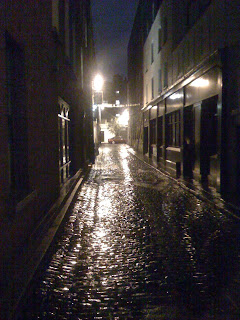
Hunger is in general release here and we were finally able to see it this weekend.
Let me first say this is not a film for the weak or the timid. A brutally honest depiction of life inside of Long Kesh prison reflects with horror the violence ravished on the IRA prisoners by the British loyalist prison staff. I noticed that more than just a few members of the audience had to leave this particular screening. I’m not sure if it was because of the violence or because of the emotional memories raised by the film.
Directed by Steve McQueen (not
that Steve McQueen but the British artist Steve McQueen) in his feature film directorial debut, it focuses on the 1981 IRA prisoner hunger strike, specifically highlighting the plight of Bobby Sands, who was the first of the ten to die.
I’m thankful that we were able to spend the time in Derry a few weeks ago and to have gained a much better understanding of the events that occurred which led up to the horrific experiences that take place in the film. I mention this because the film’s story construction, though powerful, is not a comprehensive retelling of the IRA hunger strike saga but a selective entry into these specific moments.
The emotional core of this film takes place in a scene between Bobby Sands and his visiting Catholic priest. Lasting fifteen minutes, shot in one take, it begins with rapid-fire Irish banter full of wit and false bravado then climbs the emotional mountain of the ethics of suicide and finishes powerfully with the beautiful story from Bobby’s childhood which forms his ultimate decision and comforts him long into his final moments. The tough exterior of the Irish priest cracks slightly as he realizes the true strength and deep desire of Bobby’s will. It’s a nice scene that might have been even more emotional had the director chosen to film this in traditional over the shoulder form.
There’s more than enough that is non-traditional in this story that makes it refreshing. In other words, it’s not a typical Hollywood retelling of the Bobby Sands story.
I urge you to experience this film. You won’t be disappointed. It’s brutal to watch at times and painful but it’s also very human. It begs an answer to a question that simply will not go away:
Why, in this 21st century, is this island not a united country?


















































